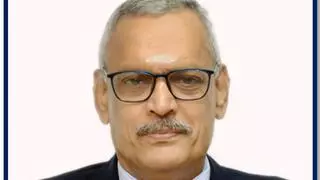In his first ever interview to the media after taking charge as IIM-Bangalore Director, G Raghuram shares his agenda for the top B-school. Raghuram, a faculty member at IIMA since 1985, took over recently as Director of IIMB. A specialist in infrastructure, transport systems, logistics and supply chain management, Raghuram, who has a PhD from Northwestern University, a PGDM from IIMA and a BTech degree from IIT-Madras, intends to bolster the public policy group at IIMB. Excerpts from the interview:
IIMB was set up with a public sector focus, given the large base of PSUs in Bengaluru. Can it have a similar orientation in the future?
Compared to IIMA and IIMC, when IIMB started, the Founder Director wanted to create managerial talent for the public sector. Since Independence and well into the ’70s and ’80s, the public sector was important. Even at that time, the private sector was hungry for talent and they valued what this talent could offer.
So, in many ways, the objective was not being served as people moved to better paying and more satisfying jobs in the private sector. In PSUs, there is a hierarchy, then other principles of excellence come in. Later, one of our Directors said that the original focus was not working and we should change focus to be more of a general management institute.
That does not mean that our emphasis in impacting public sector, public management or public policy is any less. We have the Centre for Public Policy, which has transformed from the sector-specific departments we had, to faculty who look at public policy in a basic, conceptual sense and apply that to different domains.
We have started a one-year programme in public policy for those who have already made a choice of moving into this area. Government domains do not require an MBA at the entry-level. However, a lot of our sponsored research is from government bodies. Our star faculty are advising NITI Aayog, the Health Ministry, DeITY, the Department of Agriculture, and so on.
The nature and extent of engagement has changed compared to what was envisaged. To set the context, today, the government itself is saying that a lot of things it was doing should be done by the private sector.
So, it’s the L&Ts and GMRs who are doing that and those who join those organisations, they will be impacting public works. The government also realises that there is so much more analysis they should be doing but they don’t want to be increasing people, so a lot of analysis is being outsourced to the consulting outfits.
If you walk into any Ministry you will find the Secretaries sitting with people from these consultancies who could well be IIM alumni. If our people develop their antennae in being able to do this by working through these organisations, it will be making an impact.
Will you be strengthening the public policy discipline at IIMB?
When I came in as Director, they also made me Professor of the Centre of Public Policy here. We are going in for more recruitment, as that is a group we would like to expand, and strengthen the programme. We do a slew of executive education programmes in public policy. We aim to do more. There’s a strong legacy of public sector we can leverage and we can move up the value chain, and that’s something I would definitely like to see happen at IIMB.
If one goes by placements and jobs as a barometer for the economy, would you say growth is back?
Well, like most of the top IIMs, we too had a great placement but the time duration to complete the process was longer than usual….a few days longer actually. Earlier, it used to get over by the 3rd or 4th day, this time we had a small tail, which is a reflection that the hunger in the market is not as much and this is an impact faced by all IIMs. To say that the economy has completely turned around may not be right. In general, placement for the top 75 per cent of a batch of 400 is hardly an issue. All the top recruiters anyway come for recruitment. But it’s tougher when you go to the last 100-150, where placements are influenced by the companies that come, the salaries offered, the students’ own performance. So, yes, I won’t say the economy is fully back on track.
IIMB is among the top 20 B-schools in the FT rankings. How can you push it to be among the top 10?
We would like to push our rankings up. There are some issues where we may be at a natural disadvantage despite the quality of the education we offer, and gender and faculty diversity. While within India we are good on diversity, even at the Board level, from an international perspective on what they think is desirable, we may need to move further. The rankings even look at alumni writing in. We need to build alumni connect and get them excited to write to ranking agencies. IIMB is an early starter to move into high quality research output, but again in terms of numbers we may not be there. We are working on it; our values and messaging is clear, but these are things that don’t happen overnight.








Comments
Comments have to be in English, and in full sentences. They cannot be abusive or personal. Please abide by our community guidelines for posting your comments.
We have migrated to a new commenting platform. If you are already a registered user of TheHindu Businessline and logged in, you may continue to engage with our articles. If you do not have an account please register and login to post comments. Users can access their older comments by logging into their accounts on Vuukle.